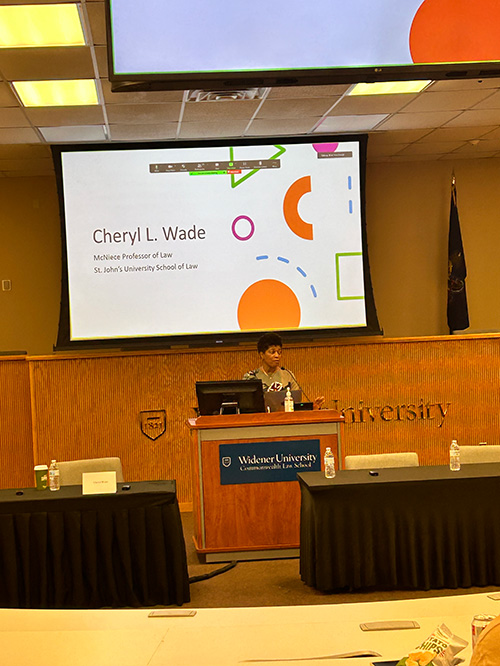
Law Review conference unpacks systemic racism’s legacy and modern realities
Widener University Commonwealth Law School hosted an impactful exploration of systemic racism during its inaugural Fall Law Review Conference, aptly titled “A Modern Examination of the Expansive Existence of Systemic Racism,” on Friday, Nov. 1. This daylong event drew approximately 75 participants, including students, faculty, staff and area attorneys, all eager to engage in critical dialogues about the historical and ongoing effects of systemic racism in the United States. The conference exemplified Widener Law Commonwealth’s dedication to fostering belonging and inclusivity within the legal community.
The event kicked off with welcoming remarks that highlighted its unique mission. Law Review President Miranda Thompson emphasized the intent to spotlight conversations around often-underrepresented issues. “Each speaker brought a unique vision and a depth of knowledge, covering topics that are crucial today, more than ever,” she stated, setting the stage for a day of thought-provoking discussions.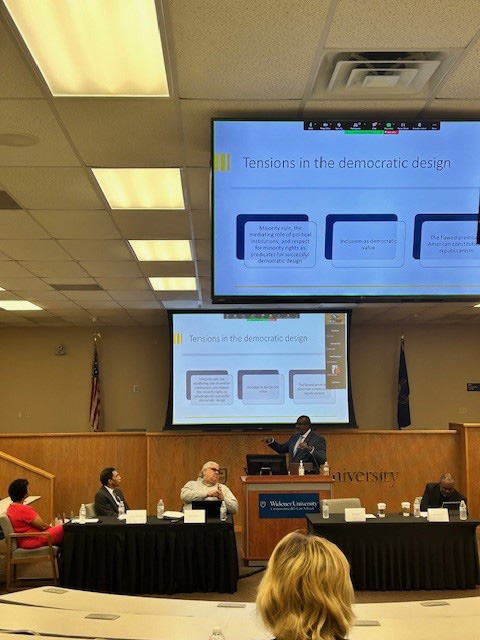
Historical Context and Economic Disparities
The first panel, moderated by Professor Kellyn McGee, delved into “The Historical Legacy of Systemic Racism.” Atiba Ellis, a law professor at Case Western Reserve University, underscored the enduring nature of systemic racism, scrutinizing the structures designed to perpetuate racial hierarchies. “We must examine how these systems were created to maintain a hierarchy that ultimately benefits certain groups at the expense of others,” Ellis noted, prompting attendees to reflect deeply on this unsettling reality.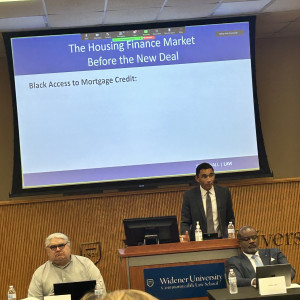
Richard Winchester, associate professor of law at Seton Hall, extended the conversation by addressing redlining and wealth inequality. “This map of Chicago, created by the federal government, shows areas color-coded based on race, where Black communities resided — areas the government decided not to invest in,” Winchester explained. “These outcomes aren’t by accident; they’re by design.” His insights resonated strongly with students who connected their academic studies to pressing real-world implications.
Second-year student Christian Kline found Winchester’s presentation particularly resonant. “The issues he discussed, like redlining, are often overlooked in history books,” Kline shared. “It’s fascinating to learn how redlining persisted and how it affected African-American soldiers who returned as war heroes, only to face discrimination at home.”
Adding to the conversation, Steven Ramirez, professor of law at Loyola University Chicago, discussed the broad societal effects of the war on drugs. “The war on drugs devastates communities of color and traumatizes children,” Ramirez asserted. “When you have a father, a parent, a brother ending up in jail, that’s a trauma — a childhood trauma.” His remarks highlighted how policy decisions continue to shape disparities in communities of color.
Corporate Accountability and Diversity Challenges
Cheryl Wade, Dean Harold F. McNiece Professor of Law at St. John’s University School of Law, delivered a compelling keynote address that tackled corporate America’s response to diversity, equity, and inclusion, or DEI, initiatives. She highlighted Starbucks’ ambitious diversity targets alongside the legal challenges they faced. “When companies tie executive pay to DEI measures, they are committing to long-term change,” Wade stated, while also acknowledging the backlash against these policies. “Ironically, laws meant to protect Black Americans are now being used against them to dismantle DEI programs.”
Wade’s analysis sparked vibrant engagement. “We need CEOs to answer tough questions about systemic racism, income gaps, and disparities in wealth and incarceration rates,” she urged. “Systemic racism must be recognized for what it is, rather than being dismissed as individual acts of discrimination.”
Examining Modern Cultural and Institutional Influences
The second panel, moderated by Professor Michal Buchhandler-Raphael, turned its focus to “The Pervasive Infection of Systemic Racism in Modern Culture.” Notable speakers included Todd J. Clark, dean of Widener Delaware Law School, who addressed educational inequality, and Erin Daly, professor emerita at Widener Delaware Law School, who illuminated how cultural narratives sustain stereotypes.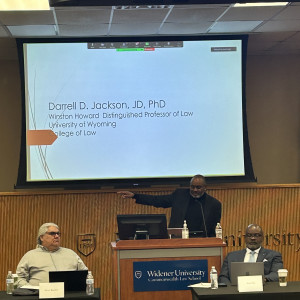
Darrell Jackson, the Winston Howard Distinguished Professor of Law at the University of Wyoming College of Law, shared his personal encounters with racial bias. “About a month ago, I was called the N-word,” he recounted. “It wasn’t in a nice academic setting where we could dialogue about the meaning of that word... It was shouted from a golf course.” His experiences provided attendees with a stark reminder of the persistent reality of racial discrimination beyond academic walls.
First-year law student Ashlee Harding, attending the conference, reflected on the significance of these discussions. “It’s valuable to hear these different perspectives from professors across the country. You start seeing issues not only through your own lens but also through the legacy and experiences of others, which is incredibly meaningful,” Harding noted.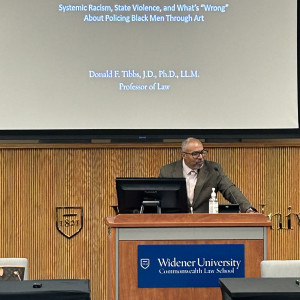 Donald Tibbs, professor of law at Drexel University Thomas R. Kline School of Law, passionately critiqued how the state sometimes uses rap lyrics to prosecute young Black men, linking it to broader issues in the criminal justice system. “Prosecutors were using an amateur YouTube video of a 15-year-old expressing himself through rap as an admission of guilt,” Tibbs shared. “We have these discussions about rap lyrics in court, but often without context. My aim is to bring that context — to show how art, specifically hip hop, critiques state power and reflects the realities of policing in Black communities.”
Donald Tibbs, professor of law at Drexel University Thomas R. Kline School of Law, passionately critiqued how the state sometimes uses rap lyrics to prosecute young Black men, linking it to broader issues in the criminal justice system. “Prosecutors were using an amateur YouTube video of a 15-year-old expressing himself through rap as an admission of guilt,” Tibbs shared. “We have these discussions about rap lyrics in court, but often without context. My aim is to bring that context — to show how art, specifically hip hop, critiques state power and reflects the realities of policing in Black communities.”
Student Reflections
The event resonated with students, who found connections to their own academic work and personal backgrounds. Second-year student Jason Dratch, who is researching heirs’ property ownership, remarked, “I really connected with Professor Winchester’s presentation because he discussed the deep history of discrimination in the housing market. I wanted to ask him if other marginalized groups, like Hispanic or Native American communities, were affected by these policies too.”
Ashlee Harding further reflected on the day’s impact: “As a student of color and a minority student, I thought it was an important panel to attend. Hearing Professor Jackson’s talk on how policing affects us, particularly as someone from New York who has seen it firsthand, was really interesting.”
Closing Reflections and Future Endeavors
Thompson closed the conference by acknowledging the event’s intellectual rigor and the vibrant community engagement it fostered. “To all of you who participated, your engagement, whether through questions or discussions, truly enriched this conference,” she remarked. “I encourage you to take the ideas you’ve heard here today and continue these important conversations.”
